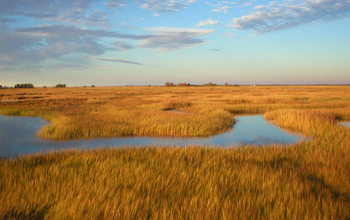351015-dodging bullets.jpg

Salt marsh in Massachusetts. Credit: Matthew Kirwan
In the 1960s comedy “Support Your Local Sheriff,” the mayor of a Western town apologizes to the newly hired sheriff when he hands him a badge that was dented by a bullet. When the sheriff speculates that the badge must have saved the life of the previous wearer, the mayor tells him that it probably would have if it hadn’t been for all those other bullets.
Recent research suggests that coastal wetlands face a similar problem. They could probably survive rising sea level just fine if it weren’t for all the other bullets fired by our planet’s changing climate.
Wetlands are an important part of the coastal ecosystem. They provide habitat for birds, fish, and other creatures. They filter pollution, and they provide a buffer against tropical storms.
As our climate warms, though, it’s making sea levels rise, which should inundate large areas of wetland. But researchers have found that wetlands can probably handle the change. The intermittent flooding by tides can build them up by bringing in more sediments, and the wetlands can move farther inland as the coastline changes.
The problem, though, is that other human activities can block a wetland’s ability to compensate for the higher sea level. Dams choke off sediments that wash into the wetlands from upstream, for example. And pumping water out of underground reservoirs causes the land itself to sink, while seawalls can stop a wetland’s retreat from the coast. These climate bullets could doom many wetlands that might otherwise survive higher sea levels.
This episode of Science and the Sea was made possible by Texas Sea Grant.

